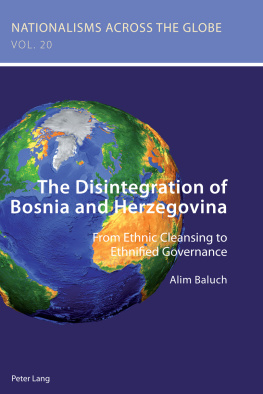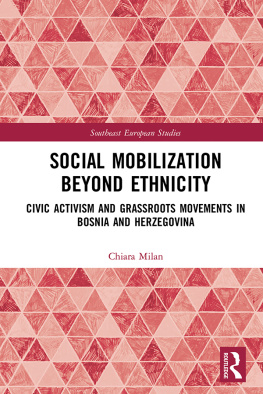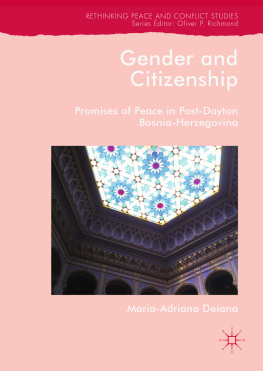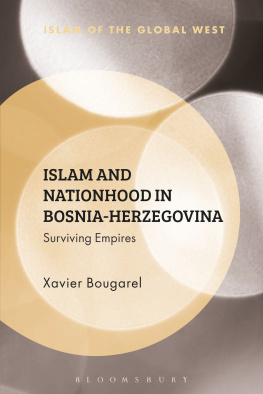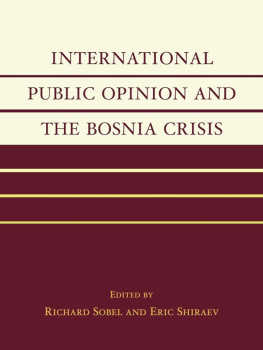Contents
Page List
NATIONALISMS ACROSS THE GLOBE
VOL. 20
SERIES EDITORS
Dr Tomasz Kamusella
(University of St Andrews, Scotland, UK)
Dr Krzysztof Jaskuowski
(University of Social Sciences and Humanities, Poland)
EDITORIAL BOARD
Balzs Apor (Dublin)
Peter Burke (Cambridge)
Monika Bar (Groningen)
Andrea Graziosi (Naples)
Akihiro Iwashita (Sapporo)
Sawomir odziski (Warsaw)
Alexander Markarov (Yerevan)
Elena Marushiakova and Veselin Popov (Sofia)
Alexander Maxwell (Wellington)
Anastasia Mitrofanova (Moscow)
Michael Moser (Vienna)
Frank Lorenz Mller (St Andrews)
Sabelo J. Ndlovu-Gatsheni (Pretoria)
Balzs Trencsnyi (Budapest)
Sergei Zhuk (Muncie, Indiana)
PETER LANG
Oxford Bern Berlin Bruxelles New York Wien
Alim Baluch
The Disintegration of
Bosnia and Herzegovina
From Ethnic Cleansing to
Ethnified Governance
PETER LANG
Oxford Bern Berlin Bruxelles New York Wien
Bibliographic information published by Die Deutsche Nationalbibliothek.
Die Deutsche Nationalbibliothek lists this publication in the Deutsche Nationalbibliografie; detailed bibliographic data is available on the Internet at http://dnb.d-nb.de.
A catalogue record for this book is available from the British Library.
Library of Congress Control Number: 2018940829
Cover image NASA/Goddard Space Flight Center Scientific Visualization Studio
Cover design by Peter Lang Ltd.
ISSN 1662-9116
ISBN 978-1-78874-361-7 (print) ISBN 978-1-78874-362-4 (ePDF)
ISBN 978-1-78874-363-1 (ePub) ISBN 978-1-78874-364-8 (mobi)
Peter Lang AG 2018
Published by Peter Lang Ltd, International Academic Publishers,
52 St Giles, Oxford, OX1 3LU, United Kingdom
Alim Baluch has asserted his right under the Copyright, Designs and Patents Act, 1988, to be identified as Author of this Work.
All rights reserved.
All parts of this publication are protected by copyright.
Any utilisation outside the strict limits of the copyright law, without the permission of the publisher, is forbidden and liable to prosecution.
This applies in particular to reproductions, translations, microfilming, and storage and processing in electronic retrieval systems.
This publication has been peer reviewed.
About the author(s)/editor(s)
Alim Baluch is a social scientist whose research interests include authoritarianism, the suppression of democracy, and governance exerted by supranational and international organisations. He teaches politics at the University of Bath.
About the book
This book argues that the international community created and managed the dysfunctional state of Bosnia and Herzegovina by effectively rewarding ethnic cleansing, drawing up a transitional constitution which, in turn, generated a complex ethnifying polity incapable of independent reform. This constitution, which was only added as an annex to the Dayton Peace Agreement, has continued to encourage ethnification, understood in this book as the reproduction of imagined communities of descent.
While accepting that foreign interference was necessary to end the war in the late 1990s, the book offers a critical review of the actions of the Office of the High Representative of the International Community (OHR) and other foreign actors since that period. It includes meticulous examination of hundreds of OHR decisions, as well as secret diplomatic cables published by Wikileaks revealing how the US embassy intervened in the countrys trade and foreign policy.
Drawing on a process-sociological perspective, the book interrogates the notion of ethnicity and offers a radical new perspective on post-war state-building in Bosnia and Herzegovina.
This eBook can be cited
This edition of the eBook can be cited. To enable this we have marked the start and end of a page. In cases where a word straddles a page break, the marker is placed inside the word at exactly the same position as in the physical book. This means that occasionally a word might be bifurcated by this marker.
| vii
| BiH | Bosnia and Herzegovina [Bosna i Herzegovina] |
| CDPR | Commission for Displaced Persons and Refugees |
| CSTO | Collective Security Treaty Organization |
| DPA | Dayton Peace Agreement |
| ECHR | European Court for Human Rights |
| EUFOR | European Union Force |
| EUSR | European Union Special Representative |
| FBiH | Federation of Bosnia and Herzegovina |
| HighRep | High Representative [of the international community and the EU] |
| HDZ | Croatian Democratic Union [Hrvatska Demokratska Zajednica] |
| HVO | Croatian Defense Council |
| IEBL | Inter-Entity Boundary Line |
| IFOR | Implementation Force |
| IMC | Independent Media Commission |
| ITA | Indirect Taxation Administration |
| JNA | Yugoslav Peoples Army [Jugoslovenska Narodna Armija] |
| OHR | Office of the High Representative of the International Community and the European Union |
| PfP | Partnership for Peace |
| PRC | Police Reform Commission |
| PRD | Police Reform Directorate |
| RS | Republika Srpska |
| RSNA | Republika Srpska National Assembly |
| SAA | Stabilization and Association Agreement |
| SBB BiH | Alliance for a Better Future for BiH [Savez za Bolju Budunost Bosne i Hercegovine] |
| SBiH | Party for Bosnia and Herzegovina [Stranka za Bosnu i Hercegovinu] |
| SDA | Party of Democratic Action [Stranka Demokratske Akcije] vii | viii |
| SDP | Social Democratic Party [Socijaldemokratska Partija] |
| SDS | Serbian Democratic Party [Srpska Demokratska Stranka] |
| SFOR | Stabilization Force |
| SNSD | Alliance of Independent Social Democrats [Savez Nezavisnih Socijaldemokrata] |
| 1
Disintegration is not a suddenly occurring event, it is a process that not only counterbalances the forces of integration which keep Bosnia and Herzegovina together; rather, it seems to become the dominant direction of travel. This book examines how post-war international rule has unintentionally planted a seed of disintegration which is almost impossible to reverse.
The subject of institutional influence exerted by international organizations on governance in a federal polity is one that has been widely researched, yet nevertheless remains of vital importance to shed light on contemporary single cases such as post-war Bosnia and Herzegovina (BiH). This study examines how international rule, first and foremost exerted by the Office of the High Representative of the International Community (OHR) and the United States Government, has turned the war zone BiH into a post-war confederation sui generis with a severely flawed constitution. Moreover, the supervision of the OHR, which has developed from a hyperactive interventionist body to a lethargic observer and mediator, has by no means had the desired effect of transforming the country into a functioning democracy.
The OHR was established with Annex 10 of the Dayton Peace Agreement (DPA) in 1995 to monitor its implementation on behalf of the international community. In December 1997, the competencies of the OHR were equipped with the so-called Bonn Powers, that is, the authority to remove any individual from public office and to substitute the legislative branch on all federal levels in BiH. These levels entail the state, the two so-called entities which have far-reaching, often state-like competencies, and the ten cantons.

